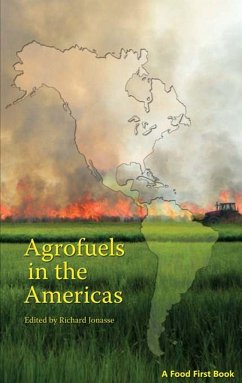Agrofuels in the Americas Behind the hype and misinformation surrounding agrofuels lie the wrenching realities of hunger and poverty, the loss of land for food production, destructive agricultural practices, the advancement of genetically modified crops and synthetic organisms; and land use changes that lead to a loss of irreplaceable biomes, contribute to global warming, and diminish planetary biodiversity. Industrialized countries, unable to meet their renewable fuel mandates, have turned to the agricultural resources of the Global South to fill their energy needs. In Latin America, Northern corporations and Southern elites have locked up vast tracts of land for industrial monocrop agrofuels: cutting down rainforests, plowing up diverse native savannahs, and destroying the future fertility of the land with short-sighted agricultural practices. Agrofuels provide agricultural corporations with an opportunity to squeeze more profit out of both food and fuel. Financial institutions looking for solid ground in a stagnating economy have jumped into the fray, pouring billions of investment dollars and Euros into agrofuel investments, fanning the flames, and causing further dislocation and destruction. International Financial Institutions are backing agrofuels as a trickle-down tool for 'rural development.' In Latin America, the rural poor and indigenous populations are losing their access to land; leading to poverty, dislocation and the inability to grow their own food. Their only recourse often lies in chasing the relatively few tenuous, seasonal jobs that the agrofuels industry provides. The agrofuels trade thus places poor laborers at the bottom of an export-oriented value chain from which they cannot escape. It has led to food shortages and increased hunger. For those familiar with the history of Latin America this is a very old story cloaked in new "green” clothing. Behind the myth perpetuated by corporations—that we can save the planet through activities that spin off tremendous environmental and social externalities—lies an ongoing consolidation of corporate power over our food and fuel systems.
Hinweis: Dieser Artikel kann nur an eine deutsche Lieferadresse ausgeliefert werden.
Hinweis: Dieser Artikel kann nur an eine deutsche Lieferadresse ausgeliefert werden.








